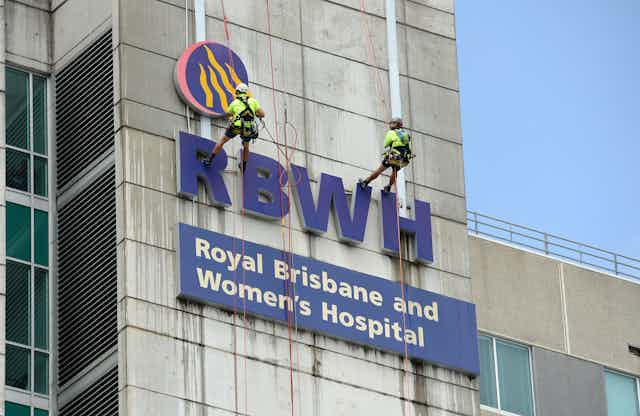It’s a sign of how much has changed in a few years that health has barely featured in the Queensland election campaign, despite being one of the issues that voters still say they care most about.
That doesn’t mean that everything has gone smoothly in Queensland health over the past three years. But after the health controversies that dogged the previous Labor government, the fact that the issue has slipped out of the spotlight ahead of the January 31 poll is a sign of improvement.
Interestingly, the current Liberal National government and Health Minister Lawrence Springborg, as well as the previous Labor government in certain areas, all deserve to share some of the credit for those recent improvements.
How Labor lost its edge on health
Health and education are traditionally two areas where state Labor parties tend to poll better than their conservative opponents, in contrast to other areas like law and order and the economy.
But in Queensland, an early election campaign poll of 800 voters found that the Liberal National Party still held an edge over Labor (46% to 43%) on which party was seen as better able to manage health and public hospitals.
Queensland Labor’s reputation for managing health took a beating under the Beattie and Bligh governments. As well as the damaging fallout from the investigations into the clinical performance of Dr Jayant Patel at Bundaberg Hospital, the long-standing under-resourcing of public hospitals and Queensland Health’s failed payroll system provided a string of public relations disasters throughout Labor’s last two terms of government.
It wasn’t all bad under Labor. Making up for past under-funding, state government expenditure on health more than doubled. Labor’s time in office also saw the establishment of a quality and safety program that was a national leader, for example, in public reporting of adverse events. And there was a massive capital program, which included commitments to three new teaching hospitals and expansion of almost every main hospital across Queensland.
But as many analysts noted, Labor’s mishandling of health was one of the deciding issues of the last election. As I wrote in 2012, there were serious challenges in the state’s health system that needed to be tackled.
What’s changed under the LNP
Compared with the spate of bad news stories under Labor, the past 12 months under the LNP government have produced relatively few adverse media reports.
There have still been some major issues involving Queensland Health services in that time. In particular, there was a prolonged and unnecessarily bitter dispute with salaried doctors over their contracts (although services were minimally disrupted).
In response to that and other government decisions, the then assistant minister for health and former Australian Medical Association state president, Dr Chris Davis, quit as the LNP member for Stafford. The government lost the seat in the by-election. Dr Davis has become an outspoken critic of the Newman government, recently urging voters to put the LNP last.
The health services have also had significant job losses, including a dismemberment of the health promotion and prevention services. That is hardly a rational decision in the face of the current chronic disease epidemic.
Allegations of corrupt behaviour by one of the new chief executive officers brought in following the change of government are the subject of an ongoing investigation. And there have been major clinical disasters, such as the events associated with a urologist at Rockhampton Hospital, in which a patient had the wrong kidney removed.
But notable improvements have been made too, which account for Labor largely running quiet on health in this election.
Greater local management and an experienced minister
There has been a very different approach to the leadership of the health portfolio. The LNP government implemented the district health services model effectively. It appointed boards and largely let them get on with their roles of managing health services. It progressively devolved responsibilities from central office to districts, taking into account local capability.
In the main, the government has trusted the boards it has appointed to do their job. The politics of public health services are frequently driven by local concerns, and should be managed locally. Of course, it is easier to ignore squeaky wheels and get on with the job when you have a massive majority in Queensland’s single-house parliament, as the LNP has enjoyed in the past three years.
Health Minister Lawrence Springborg is an experienced politician who has served as a minister in previous LNP governments, as well as being a leader in opposition. He has largely successfully managed the policy directions – and sometimes misdirections – from the Premier’s office.

In my view, Springborg has appropriately distanced himself from the day-to-day operational issues of the health services. That is a problem that plagued health ministers under Labor, who were continually flying about “fixing” hot-spots identified by the media. He has also followed through on some hard commitments, such as bringing back birthing services to country hospitals like Beaudesert.
The LNP and Springborg have benefited from the massive investment in hospitals started under Labor, which has increased capacity for elective surgery and for managing emergency department waits. Most of the hard decisions, such as the location and size of the new hospitals, occurred under Labor.
The minister has still had to manage some big challenges along the way, such as the prolonged strike at the new children’s hospital in Brisbane. Bravely, the minister has also committed – albeit after the election – to ensure that all surgery patients will have their operations within the recommended times, even if this means outsourcing these to the private sector.
I would be more impressed if the minister had committed to tackling the hidden lists: the waits for specialist outpatient services and allied health services.
However, that will remain a challenge for the next health minister – whoever that may be after Saturday’s election.

